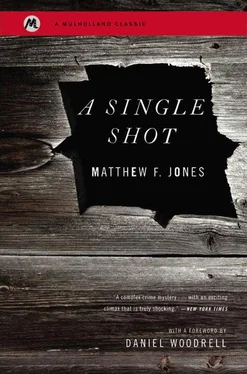Beyond a certain depth, his one hand can barely heft to the lip of the hole an empty shovel, let alone a dirt-loaded one. His efforts prove fruitless. Abruptly dropping the tool, he gets down on his knees and begins scooping up single handfuls of soil, then tossing them out of the grave. At some point during these labors, he becomes convinced that a carnivorous animal is trying to exit through his throat. Gagging, he tries to heave the beast, but having eaten nothing but berries for forty-eight hours, can’t. His skin temperature drops from hot to clammy. An almost peaceful mood attends him. He believes he is dying and is not overly troubled by it. After several seconds he is able to breathe again; then the experience upsets him terribly. “This is gon’ have to do!” he yells up at the dead girl. The floor of the swale is maybe six inches below his shoulders. Shadows half-fill the indenture. John tries to exit the grave, and finds he is unable to.
Worn out from shoveling, his uninjured limb trembles like jelly while failing to pull him up. His right arm is even more useless; monstrous-looking in its tumescence, it radiates enough pain from even the slightest pressure to present John with a phantasmagorical longing for death as life’s first prize for suffering. He nearly faints. Then, emitting a whimpering sound, he exhaustedly sits down in the grave. Though he’s not seriously concerned with being infinitely trapped there—he can, after all, always refill a portion of the hole with dirt and walk out—the idea of being imprisoned in a pit not even up to his chin infuriates him. He thinks of the hours of labor he spent to confine himself and wonders if burying Ingrid Banes will result only in more suffering for him, rather than less. Then he recalls his father saying that “life is for the living” and John’s own determination at least to try, as had Robert Moon, to be a presence in his son’s life. And how can he do that from a jail cell?
Rejecting the disheartening and painful prospect of refilling what he has dug in order to escape, he stands up, grabs the shovel, and lays it on the swale’s floor near the edge of the hole. With his good arm, he pulls himself as far as he can up the wall, then grips it with his knees, the swale’s floor with his elbow, and the shovel’s handle with his left hand. Slowly he inches the blade toward the toboggan’s lead rope where, six feet from him, it dangles from the forest floor into the swale. Several times he falls back into the grave. Each failed effort brings the blade closer to the looped rope. Finally, he manages to work the blade into the loop and, pulling the rope gradually toward him, removes most of its slack. Hoping to stop the sled next to the grave, he begins easing it gingerly down the steep bank of the swale. Suddenly he again loses his balance and, still holding the shovel, tumbles backward into the hole. In the split second that the toboggan and its contents career down the abrupt embankment toward where he lies face-up in the grave, John is aware of the birds’ heightened screeching and, once more, voices, real or imagined.
Either he has been unconscious for a day or only for a few seconds, because the hole is still half filled with dying light and overhead the crows and grackles swoop and cry. There are other noises, too. Snapping brush. Frantic whispering. Wedged by the sled’s bow against the grave’s floor, John stares into the nondislodged eye of the dead girl, catapulted by the collision onto him. She reeks a stench that begs for the warm blanket of mother earth. Spoken words float like pollen in the air above them.
“He dead?”
“Looks to be.”
I’m not! says John, only he can’t hear his own voice or feel his mouth speaking it.
“Couple peas in a pod, their eyes open that way.”
“Think he killed her?”
On’y killed one person in my life purposeful, John inwardly yells, and that one needed it!
“Blew a hole in her chest, I’d say.”
“Was a while ago, by the smell of her.”
“Wonder where he’s been keeping her at.”
“Someplace wet by the look of her.”
“Jesus, baby, you don’t suppose he had her in tha…?”
“Nah! She’s been froze, then thawed, looks like.”
John is no longer aware of the pain in his hand. In fact, none of him hurts at all. He envisions his body as a car wreck, being appraised for junk.
“Where you guess all that money came from?”
“Someplace it oughtn’t to have, for sure.”
He’s not quite certain where all his parts are or which of them he can move. Then, horrified, he suddenly realizes he is—and has been for several seconds—trying and failing to make all or any of them move. He screams a cry as muted as a shout from the center of the earth.
“Jump down there, baby, and gather up the cash. Put it back in the sack.”
“Not me, brave boy. Something spooky ’bout that hole.”
“It’s just a hole with a sled, a mountain of dough, and two dead people in it.”
“Like you see corpses every day, right?”
“It’s not doing them any good.”
His eyes won’t move left or right, forward or back. He can see only straight up, which is why he can’t see who’s talking. Beyond the dead girl’s face, past the tops of the trees, the sun-setting sky resembles in his slightly fractured vision a gently blowing field of goldenrod.
“Promise you’ll fuck me on the plane to Paris, lover?”
“Once in the can, then in the cockpit. Now get your cute ass down there and help me.”
A thud vibrates in his ears. Then another. A moment later, he is aware of the dead girl being rolled from his chest onto the ground next to him or maybe onto his legs, he can’t tell for sure. Then the toboggan is lifted from him and two pairs of arms thrust it over his head toward the swale’s floor, where it lands with a wooden slap. For a few minutes he hears the two people picking up the bills and stuffing them back into the sack from which they must have spilled.
“Jesus, let’s get out of here. The stench is killing me!”
“We haven’t got all the cash.”
“We’ve got most of it. You believe this amount of cabbage?”
“Like manna from heaven!”
“Hey, look at this. Snapshots.” John hears someone pull the Polaroids out of the waterproof envelope he’d placed them in. “Of the girl, I guess.”
“Christ, she looks half dead in ’em.”
“Why would he bury them with her?”
“Who cares? Let’s get out of here. This whole scene gives me the creeps!”
“There’s some kind of note stuck in with ’em.”
“Do me a favor, will ya? Don’t read it.”
“Whadda ya mean, don’t read it?”
“It’s bad luck.”
“Bad luck?”
“Stick it back in the envelope with the pictures and leave ’em, lover, or count me out of the whole thing!”
“All right, all right!” John hears the envelope fall next to him, then the labored breathing of one or both people rearranging the cadaver in the hole. Seconds later, female legs straddle his head; above them are a body and a face out of which poignantly stare the black she-devil’s eyes that followed John’s frantic flight from Hidden Pond. “Jesus,” she says, “you sure he isn’t alive?”
“He’s dead as this one,” says the man. Another dull thump sounds in the ground, followed by one of the dead girl’s slightly swollen hands flopping across John’s face and staying there. He hears the man and the woman exit the grave and, after a slight pause, the shovel being picked up.
“Earth to earth,” intones the man.
“Dust to dust,” adds the woman.
A scoop of falling dirt lands on John’s face. Then a second. And third. Mother earth numbly slaps his cheeks. Blackens his vision. Fouls his throat and nostrils. His mind is as disconnected from his body as a circling hawk from the world. He understands he is out of time. His panic becomes a panacea. He gives thanks for being granted on this journey the touch and scent of another human being. He fears not what comes next, but only that the dead girl might. John mutely assures her that her soul is headed to Hawaii and that only her spirit-abandoned flesh will rest here with his own, the Polaroids he took of her, and a handwritten note, telling the world:
Читать дальше












